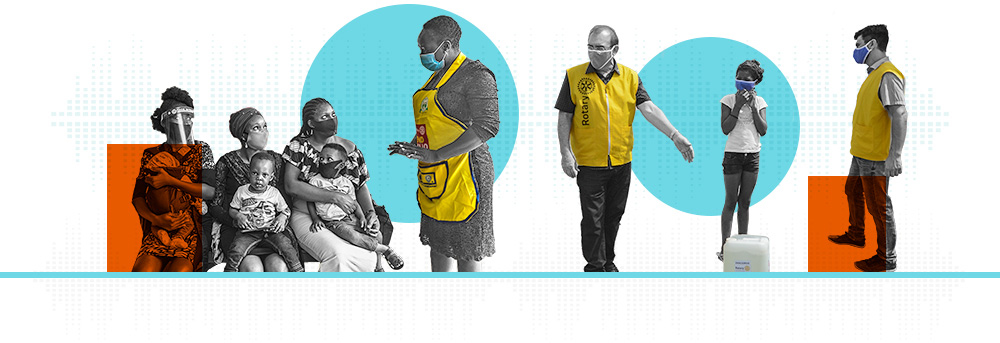
Julia Chalifoux (right), a member of her host family (center), and a fellow Rotary Youth Exchange student at the Big Buddha statue in Kamakura, Japan, in 1997.
By Julia Chalifoux, former Rotary Youth Exchange student to Japan
In 1997, at 17 years old, I spent a year living and learning in Tokyo, Japan, as a Rotary Youth Exchange Student.
Thanks to Rotary International, my time in Japan afforded me the opportunity to open my heart, mind, and eyes to a new language, land, and culture; all of this has had a profound and subtle impact and influence on the woman I am today.
In the months leading up to my exchange, I prepared myself for a year abroad, but what I wasn’t prepared for was the post-exchange experience – how returning ‘home’ again to my country of origin would also have an impact.
For me, the post-exchange experience and the subsequent reverse culture shock that I experienced was far more difficult to navigate than the initial culture shock I experienced upon arriving in Japan.

Julia Chalifoux reconnected with Tip (right) from Thailand, a fellow Rotary Youth Exchange student, during a trip to Bangkok in November.
For example, communication style differences between Japanese (indirect) and Canadian/North American (direct), made verbal and written self-expression difficult. This was proven to me during my first year of University after my return, when my professor asked me to attend his office hours so that he could identify my first language. (Yes, he was that concerned about the quality of my written work).
Dr. Amir Manzoor in his book “Advancing Teacher Education and Curriculum Development through Study Abroad Programs,” writes that “reverse cultural shock can make it difficult to manage personal relationships and emotional well-being. Some typical feelings associated with reverse cultural shock include a disconnect from family and friends and being unable to associate and interact within the environment.”
Despite these challenges, I am forever grateful for what this period of re-adjustment taught me about myself. I am confident that it is these very experiences, and the learned lessons that resulted, that continue to allow me to manage my life in a positive way.
Now, I am more mindful of taking care of my physical and mental health, compassionate towards others (especially to those facing challenges), and inspired to do meaningful work.
As Einstein once said, “Adversity introduces a man to himself.” I couldn’t agree more.
While “surviving reverse culture shock” may not be a selling point at first for the Rotary Youth Exchange Program, it is indeed an important by-product.
I am very thankful to Rotary for providing me with such an amazing opportunity.
Living in Japan and returning “home” to Canada afforded me many experiences. Perhaps most importantly, my experiences acquainted me with the qualities of resilience and loving kindness. Two qualities I am proud to possess.
Learn more about Rotary Youth Exchange.
Note: Learn more about reverse culture shock in the article “Reverse culture shock: what when and how to cope” at Expatica.com.

Pingback: 日本留学後の逆カルチャーショック、それもバネに | ロータリーボイス
Yes, when we want to hold to something strongly, he or she has to reach out to conflicting positions and return back to consolidate, what is discussed is absolutely right
LikeLike
Good article Julia. Thank you from an eternally grateful RYE student (Tokyo 1976-77). In hindsight, readjustment back into the home environment after such an intense experience at such a formative age is to be expected. The environment I returned to (school, friends & family) after my year away was pretty much the same as when I left. This amplified a sense that I had changed. Adjustment, fitting back in, awareness, reflection etc. are collateral benefits of the RYE experience. Returned RYE students often talked about post-RYE life at informal gatherings back in the day. Many experiences I had took years and maturity to process & am still thinking about all these years later. Seeing more recent exchange students interact with local hosts, and talking with former hosts, some quite elderly, about their experiences with multiple exchange students has also been very thought provoking. The RYE experience is evolving, engagement is changing, digital ease of access to home is ever-present, but the human engagement things are the same tho! Over the years I have felt embarrassed, honoured, humbled and impressed by my engagement with the Rotary families and members in the RYE program. Intense experience, complex feelings. The goodwill, engagement, interest, care, love and pride of RYE family members that I still keep in touch with to this day (I live in Japan) is evidence that the positive ripples, ongoing elements, paying forward (ongaeshi) etc. that are part and parcel of the of RYE experience. Thank you.
LikeLike
Very good and learnsome words Julia wrote. As a former RYE student back 51 years ago in Pennsylvania, I learnt about this situation without previously knowledge. However, for the past 20 years Rotary Youth Exchange Program has trained its Youth Exchange Officers – at their regional and international conferences – to deal with Reverse Culture Shock thanks to Rotarian Dr. Dennis White, a psychologist who is an expert on this matter. We thank Dr. White for his continuous contribution for our Program on this and other matters that helped to make it safer and better.
LikeLiked by 1 person